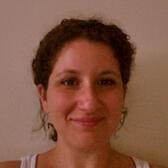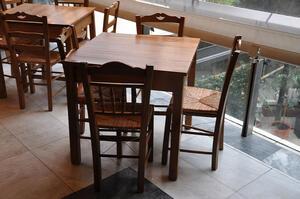How I Came to My Table
I was seated at one of those grand, heavy, deep brown mahogany tables in a beautiful room with two walls of windows. To my left, sat my mother, visiting for a few days from Los Angeles. Then to my right, and all the way around the table sat 10 classmates and my professor. We were talking about my favorite topic: How do you do good?
This table is one that I worked to come to. It is a table in a classroom at Harvard Divinity School, and I was seated next to my immigrant mother, the daughter of holocaust survivors, as my classmates and I debated the life of a famous Catholic. Around this table sat Christians, Buddhists, Catholics, Unitarian Universalists and me. I was in my version of heaven on earth. We were having a rigorous debate about a life well lived.
But even in my moment of bliss I was wondering: What sort of world do we live in? One in which my grandfather saw his father lay tefillin everyday, then saw Auschwitz and now sees his granddaughter partnered with an agnostic Christian and attending not Yeshiva, but Divinity School? How is it possible to see so much change in one life?
A few years ago I heard a presentation on the word,"‘authenticity." And the word in this new context opened my already wide eyes. That is what the goal must be when people raise their children: to raise them in a world in which they get to live their authentic lives. To explain to them the world that they live in and who they are and where they come from, so that they can figure out how to live authentically in it.
There is not a Jew in America who I know who does not wonder at how to live authentically as a Jew; who does not make compromises and take steps backwards and forwards on a journey to live their truest lives; who does not have to reckon with their ethnicity, their history, the tables they find themselves at. And it is a serious, albeit privileged struggle.
We live in a world unimaginable to people who passed away just a generation before us and yet are asking the same questions that have been asked for generations: How do I live my best life in the world to which I was born? I get to sit at this nearly gilded table as I ask this question, whereas others asked it in other circumstances.
But when people ask me, "How did you, a Jewish girl, come to study at a secular divinity school?", the only answer I want to give is that it is because I was trying to live my best, my most authentic life.
That is the attitude I carry… for that is the most good that I can do in the world. The most good I can do is to simply try to be the best, most fulfilled possible version of myself. That is how I came to my table.








Thank you for your thoughtful comment. I couldn't agree more. Seeing ourselves in terms of others can be a helpful way to understand ourselves.
What a lovely blog post. It reminds me of a period in the 1980s when I was part of New Jewish Agenda. One year I came to New York for a conference and it was held at the Union Theological Seminary. At the time, it felt odd to be in a progressive Jewish organization meeting in a Christian Seminary, but then I realized that it had also been a home to dissidents from across the street at the Jewish Theological Seminary over the years (Heschel? Mordechai Kaplan? I no longer remember). Sometimes, seeing our spiritual specificity as part of a broader universe of fellow (sister?) travelers helps us both better know ourselves, and do our best work.